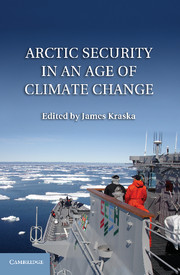Book contents
- Frontmatter
- Contents
- Figures and Tables
- Contributor Biographies
- Foreword
- Part I Introduction: Circumpolar Perspectives
- 1 Arctic Security
- 2 The Challenges and Security Issues of Arctic Marine Transport
- 3 The Arctic Meltdown and Its Implication for Ports and Shipping in Asia
- Part II European Security Interests in the Arctic
- Part III North American Security Interests in the Arctic
- Afterword
- Index
- References
3 - The Arctic Meltdown and Its Implication for Ports and Shipping in Asia
Published online by Cambridge University Press: 07 September 2011
- Frontmatter
- Contents
- Figures and Tables
- Contributor Biographies
- Foreword
- Part I Introduction: Circumpolar Perspectives
- 1 Arctic Security
- 2 The Challenges and Security Issues of Arctic Marine Transport
- 3 The Arctic Meltdown and Its Implication for Ports and Shipping in Asia
- Part II European Security Interests in the Arctic
- Part III North American Security Interests in the Arctic
- Afterword
- Index
- References
Summary
Introduction
Long neglected and dismissed as scientifically unfounded, global warming has been accepted as a new reality that will have a direct impact on the safety, security, and environment of human habitats. The effects of climate change due to global warming include the increase in frequency and intensity of adverse weather events; water shortages; sea-level rise and, as a consequence, flooding and subsequent destruction of coastlines; a decrease in crop yields as a result of increasing temperatures and a reduction in water supply; and an increase in climate-sensitive illnesses and deaths. Traditional industries such as agriculture, fisheries, and tourism might be reduced or even disappear altogether in regions that are heavily affected by climate change. Port cities located in the deltaic regions, mostly in Asia, with its vast coastline and dense population, will have to endure detrimental effects from climate-linked storm surges and rises in sea level. Hundreds of millions of people living near low-lying coasts will be displaced. Asia may soon be faced with disappearing states and loss of livelihood as a result of inundation. If societies are not able to adapt to climate change, great human suffering will occur.
- Type
- Chapter
- Information
- Arctic Security in an Age of Climate Change , pp. 33 - 44Publisher: Cambridge University PressPrint publication year: 2011
References
- 5
- Cited by



